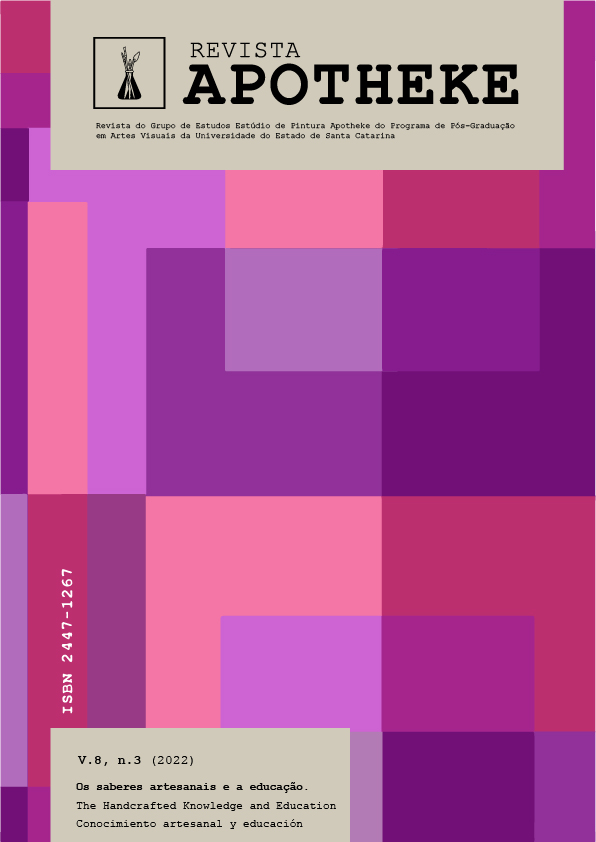Embroidery collection: cartography of a contemporary art residency with women embroiderers in the Argentine Pampa
DOI:
https://doi.org/10.5965/24471267832022037Keywords:
Textile Arts, Gender, Social Processes, Latin AmericaAbstract
The article discusses the process of investigation and artistic practice that took place from the meetings with groups of women in the sewing and embroidery workshops of a rural community near the city of Lincoln, Argentina, Buenos Aires, during the Second Edition of the International Residency. COMUNITARIA, Arte Contemporáneo y Procesos Sociales, which took place during the month of November 2017. We used embroidery to form a poetic image of our authorial work during this investigation and as a reference for reflections on the construction and deconstruction of expectations created in society and among others. women themselves about art and gender. We imagine a performative force based on the thinking of Gilles Deleuze and Felix Guattari (1995) that mediates the paths and movements that rescue histories of the residency, which we put into perspective from feminist studies and on the relations between art and gender in Latin America. We start from the idea of a nomadic artist, by Cristina Freire (2006) and from the argument developed by Sepúlveda T. and Bustos (2017) that art is a tool for political action when it is guided by a horizontal system of relationships based on attention, encounters, in the stories and in the alternative spaces of listening and concrete actions. Finally, we will show that the expressiveness of embroidery, while serving as a vehicle for a moralizing education system, can be used as a vehicle for communication and a creative space for reflection on the political condition, contesting social and aesthetic hierarchies imposed and pointing to emerging social dynamics in Latin America.
Downloads
References
BARROS, Laura Pozzana de; KASTRUP, Virgínia. Cartografar é acompanhar processos. In: PASSOS, Eduardo; KASTRUP, Virgínia; ESCOSSIA, Liliana. Pistas do método da Cartografia. Porto Alegre: Sulina, 2009.
BIAZUS, Camilla Baldicera. Da mãe-aranha à mãe-costureira: as formas e movimentos da maternidade na obra de Louise Bourgeois. Ide (São Paulo) [online]. 2020, vol.42, n.70. Disponível em: http://pepsic.bvsalud.org/scielo.php?script=sci_arttext&pid=S0101-31062020000200011&lng=pt&nrm=iso Acesso: 08/05/2022.
BUTLER, Judith. Problemas de Gênero: feminismo e subversão da identidade (tradução de Renato Aguiar). 16ª ed. Rio de Janeiro: Civilização Brasileira, 2018.
CATÁLOGO DE EXPOSIÇÃO. Transbordar: transgressões do bordado na arte. (Curadora Ana Paula Cavalcanti Simioni) - São Paulo: Sescsp, 2020.
FEDERICI, Silvia. Mulheres e caça às bruxas: da Idade Média aos dias atuais. Trad. Heci Regina Candiani, São Paulo: Boitempo, 2019.
FREIRE, Cristina. Contexturas: Sobre artistas e antropólogos. Texto do Catálogo da 27ª Bienal de São Paulo, Fundação Bienal, 2006.
FREIRE, Paulo. Extensão ou comunicação? 10. ed. Rio de Janeiro: Paz e Terra, 1994.
GEHRKE, Laura Clara. Bordando Feminismos: uma questão de gênero. (Trabalho de Conclusão de Curso (Graduação) – Universidade Federal deo Rio Grande do Sul, Instituto de Artes, Curso de História da Arte, Porto Alegre, RS, 2021. Disponível em: https://www.lume.ufrgs.br/bitstream/handle/10183/223169/001127778.pdf?sequence=1&isAllowed=y Acesso: 07/01/2022.
DELEUZE, Gilles e GUATTARI, Felix. Mil platôs: capitalismo e esquizofrenia (volume 1). - São Paulo: Editora 34, 1995.
GLUZMAN, Georgina. El trabajo recompensado: mujeres, artes y movimentos femininos em la Buenos Aires de entresiglos. In: Numéro 5.Artelogie, nº 5, Octubre, 2013. Disponível em: http://cral.in2p3.fr/artelogie/IMG/article_PDF/article_a265.pdf Acesso em: 15/10/2018.
GUIMARÃES, Mariana. Bordadura como linguagem de experiências, afeto, vínculo e liberdade. 24º Encontro da ANPAP: Compartilhamentos na Arte, Redes e Conexões. Santa Maria, Rio Grande do Sul, 2015. Disponível em: http://anpap.org.br/anais/2015/simposios/s12/mariana_guimaraes.pdf Acesso em: 30/07/2019.
NOGUEIRA, Cláudia Mazzei. A feminização do mundo do trabalho: entre a emancipação e a precarização. Campinas, SP: Autores Associados, 2004. Disponível em: https://tede2.pucsp.br/handle/handle/17846 Acesso em: 02/05/2019.
PELLEGRINO, Antônia. Sobre mulheres em motocicletas roxas. Memórias do Feminismo dos anos 1960-70. Revista Quatro cinco um. Maio de 2017.
SEPÚLVEDA T., Jorge. Comunitaria: experiencias de arte y comunidad. 1.a edición bilíngue – Santa María de Punilla: Curatoria Forense, 2017.SEPÚLVEDA T. et al. Incerteza e Interpelación/ção. 1.a edição bilíngue – Córdoba: Curatoria Forense, 2022.
TIBURI, Marcia. Feminismo em comum: para todas, todes e todos. 4ª ed. Rio de Janeiro: Rosa dos Tempos, 2018.
Downloads
Published
How to Cite
Issue
Section
License
Copyright (c) 2022 Adriene Coelho Ferreira Jerozolimski, Maristani Polidori Zamperetti

This work is licensed under a Creative Commons Attribution-NonCommercial 4.0 International License.
Copyright and Licensing Policy
Authors of works submitted to Revista APOTHEKE authorize their publication in both print and digital formats exclusively for academic purposes. Reproduction is permitted, provided that the source is properly cited. Authors confirm the originality, authorship, and unpublished status of their manuscripts.
Articles published by the journal are freely available and intended for academic and non-commercial use only. All copyrights are transferred to the journal. The content of signed articles reflects the views of their respective authors and not the official position of Revista Apotheke. The author(s) agree to always cite the following reference when republishing or referring to the content originally published in Revista Apotheke:
“This article was originally published by Revista Apotheke in volume (insert volume), number (insert number), year (insert year), and is available at: http://www.revistas.udesc.br/index.php/APOTHEKE/index”
It is the sole responsibility of the authors to obtain written permission for the use of any material protected by copyright law included in their articles. Revista Apotheke is not responsible for copyright infringements committed by contributors.
Authors retain copyright and grant the journal the right of first publication, with the work licensed under a Creative Commons Attribution-NonCommercial License (CC BY-NC):
-
Attribution (BY): Licensees are allowed to copy, distribute, display, perform, and create derivative works, provided that proper credit is given to the author or licensor, in the manner specified.
-
NonCommercial (NC): Licensees may use the material only for non-commercial purposes.
After publication, authors retain the rights to their work and may republish the text.



